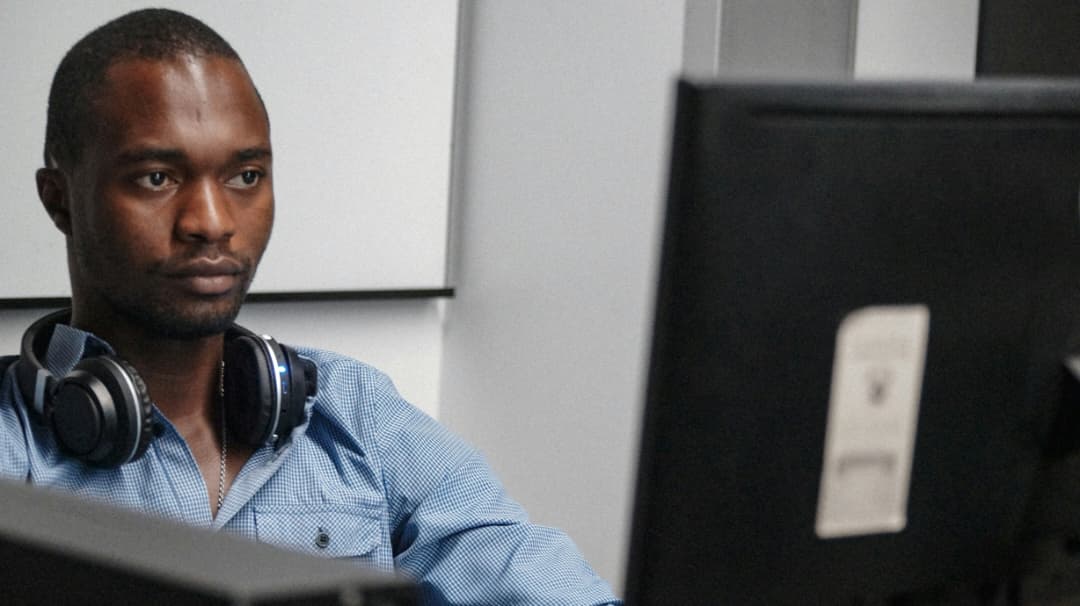On Not-Satisfying Your Examiners

“It was a Friday, I can remember vividly. I kept drifting in and out of sleep because I was too scared to face any reality where I failed. The results dropped, and I was shaking so bad before even opening it. I searched through the list three times, and I did not find my matric number, and that was how I confirmed that I neither passed biochemistry nor anatomy – so repeat.” I cried so bad, then I texted my dad ‘Hey, Dad, I fucked up. I did not make clinicals.’”
Medical school is exhausting and will make you get so comfortable with failing. The first few incourses in preclinical school would make you think you’ve flirted enough with failure, if you ever failed any. But nothing, not even scoring 30 out of 100 on an in-course, prepares you for not satisfying your examiners. That’s Lekan’s story.
If you’ve never written a medical board examination, here’s how it goes in the College of Medicine, University of Ibadan. You’ll struggle through months of lectures, ensuring that you make 75% attendance, while writing multiple incourses. The exam timetable will be released not less than two weeks before the exam date; it will be the most daunting experience. You will write the exam from 9 am in the morning till late in the afternoon. You will write till your hands ache, you’ll move from station to station till you start hallucinating bells telling you to move, you’ll face your examiners one-on-one and dare them not to be satisfied.
After going through all this, no one expects to fail. So you wait, you dream up questions that you answered incorrectly, and you just keep waiting. When the results are eventually released, they do not send personal emails with the “congratulations, you have satisfied your examiners” message. It is rather unceremonious, just “The following students have satisfied their examiners”, and they list the matric numbers.
When your class rep sends the list, there will be different lists. The one for those who satisfied their examiners, the one for those who were referred and the one for those who have to repeat. Hands-shaking, your mind screaming out prayers to your maker, you’ll scroll through the list hoping your name is in the first list.
But if it isn’t, the world probably goes silent for the first minute. Or like Lekan above, you search twice more, hoping you made a mistake on your first and second try. And when you realise you did not, you cry and call your parents.
Failing; whether resitting one exam or repeating an entire year is not a germane concept in medical school. During the recently concluded MBIV examination, more than 15% of the class had to resit a course or repeat the class. For almost every exam written in COMUI, at least one person fails. Most people consider the idea that they may fail, but no one ever really sees it coming.
For Kola*, who repeated a class, he shared that “I knew of the possibility. I knew a resit was most certain in anatomy, but I didn’t think I was going to fail Biochemistry and repeat the class.”
In COMUI, a “resit” means retaking one failed course. While a “repeat” means retaking the entire academic year. You have a resit when you fail to get up to 50% out of 100% cumulatively in one course, or when you fail to get up tp 50% in the pratical aspect of a course (referred to as clinical failure). A repeat occurs when you had a resit and then failed the resit exam, or when you failed two courses (clinical or cumulative failure) in an exam.
In preclinical school, if you keep track of your CA(in-course) scores, you can calculate how much you would need to pass the exam. You can also predict if you’re borderline and attempt to make up for it in your exams. This was the case for Lekan.
When asked if he saw this coming, he said, “Well, 50:50 to be honest. You see, the ‘rule’ was that you were safe if you had at least half in the test aggregates. I had 12/40 in anatomy and a little below 15 in biochemistry. It was expected, because of that, but I also believed I could get 40+ in the exam, so I focused more on that instead. My physiology was okay, so the plan was to read anatomy and get above 40 – then come back to resit biochemistry so I don’t repeat instead. It didn’t turn out well”.
And for some, they could not have imagined that they would fail an exam, especially seeing as they had passed all their previous exams without so much as a resit or repeat. But on the final exam, something goes wrong. Bode, who is now a medical doctor and is about wrapping up his housemanship, shares that “it was unexpected because it was my first time resitting an exam in medical school”.
The immediate consequence is being left out of the “congratulations” or the “I satisfied my examiners” proclamations. The next is facing your family and friends. For Lekan, this part wasn’t so hard to scale through, as his family was very supportive. His father’s response was immediate “What do you mean you fucked up? And so what? Just stay where you are, I’m coming with your mom.” Within the hour, his parents arrived, packed his belongings for the weekend, and took him to eat hot amala with “plenty of protein.” By Monday, he was back in school making plans to join the new set. They never mentioned it after that day.
Lekan explains that his father had always made the family comfortable with the idea of failing, not encouraging it, but normalizing it. “I’d always been a ‘local champion’ so to speak,” he says. “But he’d always reassured and told us that it was okay to fail; what wasn’t okay was to not get back up after failing.” His father shared notes of his own academic struggles and perseverance.
Lekan recalls a moment from his childhood: “I remember that I came 3rd in my primary 4 (first time), and I was too ashamed to go home after the prize-giving ceremony. I just hung around even after everyone had gone, sobbing. My dad found me later in the evening and asked me why I didn’t come home, and I told him I came third. He lifted me on his shoulder and said he was proud regardless.” His whole family, he says, didn’t treat failure as anything special, so when it happened, life simply moved on. His father only told him to be comfortable resuming with the next set and that was it.
For Kola, while his parents remained supportive through it all, they did not hesitate to give him the much-needed reality check. When he called his father to apologize for letting him down, his father was firm: everything Kola did was on him and he had let himself down, not his father. His mother was also blunt, telling him, she’d seen it coming and had warned him. She suggested the experience might teach him some humility and make him take things more seriously, but also reasssured him not to dwell on it. The best thing was to move on and learn from it.His aunt and uncle tried to pacify him, referencing several renowned doctors who repeated a class during medical school. Reflecting on their approach, Kola says, “I don’t wish they did anything differently; They gave me a reality check and told me to get my act right.”
After facing the family, the next thing was facing friends or innocent well-wishers who would send their “congratulations” and delete them hours after because they had heard the news. Aside people who know your matric number, everyone just congratulates the members of the class who have just concluded their exam.
When friends or classmates do find out, some do not know how to approach the topic. Susan* shares “When my friend and classmate had a resit, I did not know how to talk about it with her. I do not think she wanted to talk about it either. It just felt like we both knew and chose not to address it. When she wrote the resit exam and passed, I congratulated her, and that was it.”
For Lekan, his friends were as clueless as Susan was. Most of them did not know what to do. A few had no idea that he’d repeated and sent congratulatory messages, then deleted quietly a few hours after. A few who knew he was already struggling texted to comfort him. His best friend was in Lagos and immediately started coming to Ibadan.
A few people quietly removed him from seeing their statuses so he wouldn’t feel worse about them celebrating. Many sent DMs to offer sympathies and encouragement. “Some didn’t even know whether to reach out or give me space, and I understood every single one of them.” He says. Also adding “I had a few friends visit me physically a week or two after with goodies and all to try to comfort me.” Kola’s friends tried to comfort him, but one reminded him that he could and should have done better.
After everyone moves on from the results of the exam, you are stuck with adapting to your new normal. For folks who have to resit an exam, they have to study for this exam while continuing with their normal postings. The resit exam usually comes three months after the exam results are released. Preparation for this exam would sometimes coincide with another course (End of Posting Test). So it means double the work.
If the resit happens in the final year, this means you watch on the sidelines as your mates get inducted, start housemanship and move out of the hostel. For students who have to repeat a class, the difficulty lies in finding the energy and motivation to join the new class and making new friends out of the new classmates. Regarding this, Lekan said, “My new classmates were accommodating. It’s one of the things I instantly loved about the class. When I initially joined, I was sitting alone at the back, segregated from the rest. I had a few of my secondary school juniors in the same class as well, so you can imagine what it felt like.”
But he chose to own his story. He embraced the repeat tag. When people queried his presence in the class, he simply told them he was a repeat student. “I got more comfortable introducing myself as that, and no one really batted an eyelid; they just introduced themselves in return,” he says. The class rep was also integral in bringing him up to speed with the rest, and within a few weeks he’d adapted to calling them his coursemates.
For Kola, the adaptation has been more difficult. He doesen’t think he has fully adapted yet. It was very painful and stressful at first because he had to attend classes all over again. The making of new “acquaintances” too was draining. “It’s all behind now and everything’s good, although sometimes, I get depressed for a couple of seconds and then move on with my life,” he says.
Bode wrote his resit exam three months after and passed. As a final year student, it wasn’t hard for him to put all his focus into passing the exam, especially as he now had one coursework to focus on compared to when he had four.
Lekan’s required a little more than that. He said, “I paid special attention to getting my test aggregates up before MB, so I was on a comfortable score by the time it was time for MB. My mistake was completely sidelining tests, thinking I could just get the required marks in the MB. I never read for any of my initial tests in my previous set; I only started reading after CA5. But this time, I got my test scores up in each CA and barely needed a few from MB”.
No one ever sees it coming, even if one considers the tiniest possibility of it, the worst one ever imagines is a resit. And nothing prepares you for it. While there are a billion things one could do to prepare for an exam in medical school, it’s a persistent probability. Being in medical school, specifically COMUI, means you deserve and are smart enough to be here. “It’s never the end of the world. Before seeing the results, I felt like I’d unalive myself if I ever repeated because what kind of shameful thing is that? But I did, and the world didn’t end. No one ever shamed me, well, to my face. It’s genuinely not as bad as people think it is, and I consider it to be a minor setback. I think one of the things I felt ashamed of was that it felt like I was an absolute dullard. Realising that even the smart ones can fail medical school was liberating,” Lekan says.
Yes, people do fail, although the percentage is low. In Dr Bode’s words, “It is not the end of the world, because I am doing my house job, in my tenth month of housemanship. Nobody sees me and asks, ‘Oh, did you have a resit?’ No one has ever asked me that. Also, people have different paths after medical school. Some people get a resit, pass their USMLE steps 1 and 2, and go abroad. Some people pass immediately, take a while longer before they can. Yes, it is going to be incredibly painful, and it is going to be easy to just say ‘take it like a champ and move on,’ but to be honest, it does not deter you.”
Bode is a medical doctor now. Lekan, and Kola are back in school too, attending classes with their new sets, building new friendships. And somewhere in Ibadan, another student is currently nervously waiting for exam results, convinced like everyone else before them that failure couldn’t possibly happen to them.
* The names of the interviewees have been changed.




